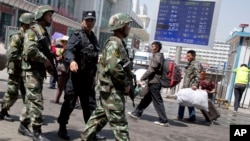Chinese authorities have ordered all motor vehicles in Bayingol prefecture in far-western Xinjiang to be installed with mandatory satellite tracking devices, the latest tough anti-terror measure targeting the ethnically divided region.
China has been stepping up already tight security in restive Xinjiang after a rise in violence in recent months.
Hundreds have been killed in Xinjiang in the past few years, mostly in unrest between the Muslim Uighur people, who call the region home, and the ethnic majority Han Chinese. Beijing blames the unrest on Islamist militants.
"Cars are the main transportation means for terrorists, and are also a frequently chosen tool to carry out terrorist attacks," the Bayingol traffic police said in a post on its official Weibo microblog account on Feb. 4.
All vehicles will be required by June 30 to install GPS-style tracking devices connected to China's proprietary Beidou navigation satellite, "so they can be tracked wherever they go", the state-run Global Times reported on Tuesday.
It would also help car owners to find their vehicles quickly if they are stolen by terrorists, the report said.
Cars not fitted with the devices will be unable to buy petrol at service stations in Bayingol, nor be resold on the second-hand market.
Remote and sparsely populated Bayingol occupies a huge part of southeast Xinjiang, although much of the violence has been concentrated further away near Kashgar and Hotan in the southern Uighur heartland.
The government has blamed much of the unrest on separatist Islamist militants, although rights groups and exiles say anger at tightening Chinese controls on the religion and culture of Muslim Uighurs is more to blame.
China routinely denies any repression in Xinjiang.
Violence has continued to flare particularly in the more remote southern regions of Xinjiang, although accounts are difficult to verify independently and exiles and rights groups suspect incidents are underreported.
Last week, Chinese security forces in the regional capital of Urumqi and the Uighur hub of Hotan staged large-scale anti-terror rallies, parading thousands of armed police and paramilitary, as well as dozens of armored vehicles, through city streets.
Last week, three knife-wielding attackers were shot dead after killing five people in Pishan County, in Hotan prefecture.
In December, five people were killed when attackers drove a vehicle into a government building, with police shooting dead the three perpetrators.
